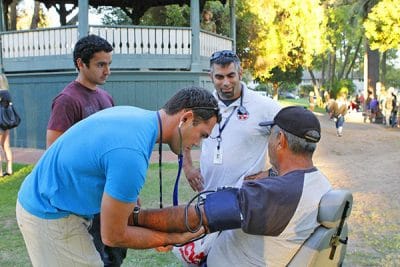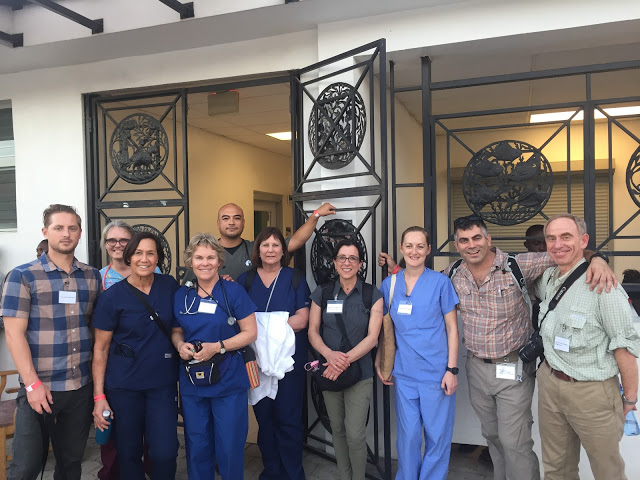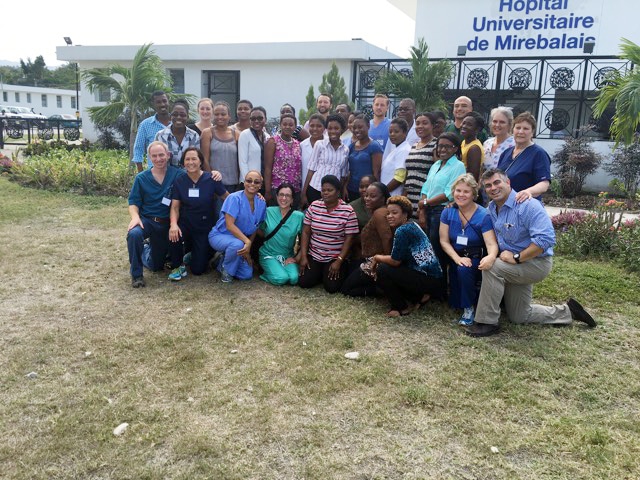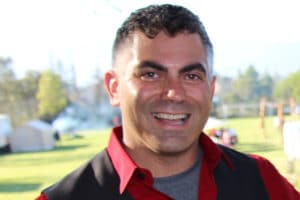Jason Prystowsky, MD, MPH: Medical Care Near and Far
BY MELISSA WALKER
Prystowsky spoke with impactmania about his journey, the impact of his efforts as a physician in the U.S. and abroad and his impact makers.
Why medicine? What, or who, inspired you to become a doctor?
Why medicine is a complicated question. We do not choose the calling of medicine, it chooses us.
Both of my grandfathers were doctors who taught me very different lessons.
My poppy Dave, a surgeon in Dallas, was an adventurer, a world traveler, and never missed an opportunity to tell a poorly timed, crude joke.
My poppy Milt, a pediatrician in New Jersey, was a tireless advocate for the health of children, and a strong political voice promoting access to care for the most disadvantaged of New Jersey.
Both had a profound influence on my life growing up. They were role models in medicine and in life, and inspired me in very different, yet complimentary ways.
A more pertinent story to our local Santa Barbara Community, at age 21, I was a young EMT on an ambulance, learning medicine from the streets, interested in one day becoming a novelist or high school English teacher.
The group of emergency physicians at Santa Barbara Cottage Hospital took me under their wing and their mentorship convinced me to go to medical school.
Now I have the privilege to work alongside my mentors. I always tell my doctor colleagues to be cautious about what they say, and to whom, because they may accidentally inspire the next Albert Schweizter, Paul Farmer, or future leader in humanitarian medicine.
Please share a little about your background? Where were you born, and how was it like growing up? Where did you attend college, and medical school, and how did you end up in Santa Barbara?
As a boy growing up, my family would spend summers in Santa Barbara, so it is no big surprise that I went to UCSB for college. I studied philosophy and biology. I was president of the philosophy club, worked in a parasite lab, and played rugby for a couple years.
A friend told me to take the EMT course at UCSB. You get to drive trucks fast, can get work as medical staff for events, and girls like the uniform, so I signed up. I loved it.
I got a job working for Santa Barbara County AMR. While many of my comrades were passionate about the pre-hospital world of lights and sirens, I became immersed in medicine. I was hooked.
Some of the most important lessons about the art of medicine I learned from my paramedic partners and nursing colleagues before ever stepping foot inside the door of Northwestern School of Medicine. I attended Northwestern school of medicine, and went to night school to get my masters degree in Public Health. I wanted to learn not only how to take care of sick individuals, but how to evaluate and care for the health of communities.
I went to Atlanta to do my specialty training in emergency medicine. Instead of working for the CDC after my training, as I had originally set out to do, I took a detour that took me to some odd corners of the world.
I spent some time with Indian Health Services on the Navajo Indian reservation in Northern Arizona. I was in Uganda with Doctors for Global Health and in Haiti with MediShare. I worked for Doctors Without Borders/Medicins Sans Frontieres in South Sudan and with USAID in the West Bank. I even spent some time in Antarctica.
But ultimately, I landed back home in Santa Barbara, where I belong.
Talk to me about DWW-SBSM? What appeals to you most about the organization? Are there any new services or programs that you’d like to share with impactmania readers?

Photo courtesy DWW-SBSM
DWW-SBSM is a local nonprofit that provides free medical care to the homeless, the working poor, or to whomever there is need including in times of disaster.
It is a very exciting organization to be part of, and I strongly encourage impactmania readers to come join us.
In short, if you want to make your world better, you really do not have to travel that far as principles of social justice are universal. There is need everywhere, and it is so easy to give back.
We have so many programs worth mentioning. We run a free mobile clinic out of backpacks in the parks. We have a women’s free homeless clinic hosted by Transition House that provides wrap around, interdisciplinary care with medical services, laundry services, amazing lunch provided by Organic Soup Kitchen, acupuncture, Qi-Gong, psychological counseling, and shower services.
We have a special missions team which goes out to homeless camps in search of high risk individuals to provide hospital/clinical followup or medical care. We help provide a free medical clinic at the warming centers during wet and cold weather.
We sponsor a seminar at UCSB where speakers come from all over the world to inspire and educate our students about care of underserved, vulnerable populations ranging from care of the homeless, to violence prevention among gangs in Brooklyn, to treating Ebola patients in West Africa, to caring for refuges from Syria, and more.
One of our innovative programs with DWW-SBSM is our companion care team. Part of the art of medicine is knowing our limitations, and when a patient has a chronic medical condition that exceeds our ability to manage on the streets, we use our companion care team to establish a relationship with the patient and companion them to an appointment at one of our many amazing Santa Barbara partners such as the Santa Barbara Neighborhood Clinics, the Indian Health Clinic, or the VA Clinic.
As we continue to grow with the support of our community we are hoping to continue to expand to meet the needs of our community, and to continue to work collaboratively with our amazing partners.
You recently traveled to Haiti with co-workers. What was the purpose of the excursion and what was the ultimate outcome?
In Haiti, almost 85-percent of professionals leave the country, and the earthquake devastated its medical schools, nursing schools, government ministry of health, and educational centers.
A team of 11 Santa Barbara doctors, nurses, and respiratory therapists in connection with EqualHealth went to Mirebalais, Haiti, in February of 2016 to the new state of the art, Partners in Health flagship hospital, to teach a one week critical care course to Haitian doctors and nurses. We had the lecture slides and course manual translated into French.

Santa Barbara Team Haiti at the entrance gates of the hospital. From L to R: Dr. Connor Johnson, Patti Wicklund, Kaina Gomard, Maggie Cote, Mario Guillen, Diane Barkas, Dr. Lisa Ferrigno, Dr. Kacie Brumley, Dr. Jason Prystowsky, Dr. Jeffrey Fried. Photo courtesy DWW-SBSM.
This, we hope, is the first of many educational trips involving Santa Barbara clinicians teaching and coaching our Haitian counterparts.
My cousin is a musician in Providence, RI, and he always says that no matter where in the world you go, you can always “jam” with other musicians. I feel the same way about medicine.
Fighting illness and advocating for health is truly a universal language that brings brilliant, creative, and compassionate souls together from all over the world to jam and make music together.

EqualHealth and Santa Barbara Mirebalais, Haiti, team at the Partners in Health flagship hospital. Photo courtesy DWW-SBSM.
You’ve traveled all over the world helping people and saving lives. What qualities do you see in the people you treat that are universal?
Wow, Melissa, you ask really tough questions. The academic in me wants to descend into a scholarly treatise on cultural anthropology. There are certain universals. So allow me to take the following scenarios from my personal experience.
Caring for a family who has been displaced due to an active genocide during the conflict in South Sudan, caring for a family living with complicated political constraints in the West Bank of the Palestinian Territories, caring for a nomadic family in rural Mongolia near the Kazakhstan border, caring for a Navajo family in the rural Navajo Nation, caring for a family who lives in poverty in inner city Atlanta, caring for a family of subsistence farmers in the Central Plateau of Haiti, caring for a wealthy family in Montecito.
The factors that truly impact health are far outside of the control of any physician, nurse, or health care provider. Sometimes the only thing that we in medicine can do, is share the stories about what we see to make real change that will influence real results.
We live in a world of extraordinary inequalities. There will always be those who profit from, tolerate, or ignore those inequalities, and those who address those inequalities in a constructive and collaborative way.
As a physician, what has been your biggest professional disappointment, and achievement, so far?
We in medicine always remember the faces of people we could not help more than we remember the ones we could. Some of us call them ghosts. They stay with us.
I have too many ghosts and too many professional disappointments to mention in a short impactmania article. Some of them haunt me. Some of them inspire me. But they all stay with me and remind me what’s at stake and why I chose a career in medicine.
And, I hope my best achievement is yet to come. Maybe I’ll have the pleasure of working with some of the impactmania readers on a project in the future.
What are some of the health care challenges that you see and face worldwide?
Poverty. War, conflict, ethnic violence, police violence, gang violence, inability to feel secure in the community. Institutionalized violence and structural racism, sexism, classism, religious persecution. Mental illness.
Poor access. Poor access to healthcare clinics and hospitals, to drinking water – whether in Michigan or SubSaharan Africa — to effective treatment of mental illness, to sanitation, sewers, waste disposal systems, to vaccines – either due to misinformation or lack of safe and low cost distribution, and to pharmaceuticals and surgical procedures.
Just to name a few of many challenges. Any impactmania readers have any good suggestions on solutions? We need a lot of bright people at the table working on this.
There are mobile apps and telemedicine services, such as LiveHealth online, DoctorOnDemand, HelloMD. Do you see the future of health care rapidly evolving with the help technology? Explain why?
I have always been a believer in the tool box approach to medicine. There is no one tool that fixes all problems. Part of the art of medicine is finding the right tool for the right job.
Technology helps us expand the scope and depth of what we can do in improving people’s health. We in healthcare need to always be educated, informed, and sometimes self disciplined on how best to use this technology in the process of improving people’s health.
Some people are going to have simple problems that will not need a trip to the doctor’s office or hospital, and some of these new innovative apps may be very good at helping address simple, low acuity healthcare concerns.
There certainly is a role for telemedicine and mobile phone apps, but I think that we are still trying to figure out what that role is.
What’s next for you?
DWW-SBSM is continuing to expand and fill gaps where we are needed. We will still continue to bring healthcare to the people who need it most, and to educate the future leaders of medicine.
There will be more global health projects on the horizon through EqualHealth and other various organizations.
At Santa Barbara City Fire Department we are hoping to continue to improve the already excellent 911 medical responses to our local community.
And, I am hoping to work on my novel a bit more in the coming year. And if you ask my girlfriend or dog, they will tell you that I am planning on spending more time with them on the beach.
Who are your impact makers?
Both of my grandfathers. My patients. My students. My colleagues. My dog Kivu, who taught me the value of staying in Santa Barbara and not traveling in pursuit of ideas quite so much anymore.
Main profile photo of Jason Prystowsky, MD, MPH, by Melissa Walker. Inset photos courtesy DWW-SBSM.
Jason Prystowsky attended University of California at Santa Barbara where he studied both philosophy and biology. He then went on to get a medical degree and public health degree at Northwestern University in Chicago, IL.
In the global arena, Prystowsky has worked in Uganda, Haiti, Mongolia, Nicaragua, Guatemala, Honduras, Ghana, Antarctica, and worked for Medicins Sans Frontieres/Doctors Without Borders in Sudan doing nutrition, vaccination campaigns, obstetrics, TB, kala-azar, tropical medicine, and surgical trauma. He also worked in the West Bank with Loma Linda University and USAID, helping the Palestinian ministry of health develop emergency healthcare infrastructure, disaster preparedness, and train emergency physicians and nurses.
He is faculty at University of California at Santa Barbara, the coordinator of DWW-SBSM annual UCSB underserved medicine course, the faculty adviser for UCSB Street Health Outreach and the UCSB chapter for Global Medical Brigades, and the medical director for Santa Barbara City Fire Department. He currently is the team leader for the DWW-SBSM communications and the medical director.


